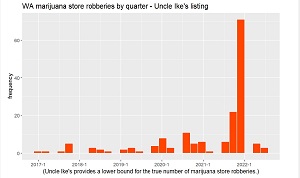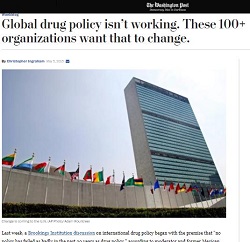StoptheDrugWar.org has supported cannabis (marijuana) policy reform since our founding 30 years ago -- through movement-building programs, reporting in the Drug War Chronicle newsletter, and other support for efforts to legalize marijuana, provide medical access to patients, and end or reduce related punitive or intrusive policies.

Dangerous Delays is the first published study on characteristics of cannabis store robberies. It responded to the December 2021 delay in the US Senate of "SAFE Banking" legislation and arguments made at the time that cast unjustified doubts on the role cash plays in crime directed against cannabis retail stores and their workers. A second study and report are underway, and related work making use of the report is ongoing.
- Dangerous Delays report (12/8/22)
- news release (12/9/22)
- launch webinar (12/22/22)
- Marijuana Moment article (12/8/22)
- The Center Square article (12/26/22)
- David Borden testimony on Maryland legalization implementation bill, House Economic Matters Committee (2/17/23) and Senate Finance Committee (3/23/23)
- written testimony for Senate Banking Committee hearing (5/17/23), submitted to the Congressional Record by Sen. Daines
- sign-on letter to Congress, including United Food and Commercial Workers International Union, (group list as of 9/26/23)
Internationally, since 2015 we have argued the human rights case justifying drug legalization, but cannabis legalization in particular, under the UN treaty system. There is language in the three UN drug conventions that is in tension with national moves to legalization. We argue that the global prohibitionist drug control system inevitably leads to very serious human rights violations, and it's human rights that takes precedence over other issues under the UN Charter.

The statement was covered in media outlets including WashingtonPost.com. We also organized a teleconference for media on prospects for marijuana legalization in Canada and Mexico, featuring Mexican Senator Laura Rojas and Canadian Member of Parliament Nathaniel Erskine-Smith, as well as representatives of leading NGOs from both countries. Our teleconference led to the first mention by major media, in The New York Times, of the fact that the US despite moving toward legalization has opposed taking up discussion of drug convention amendments at the UN. (The NYT article does not cite us, but that information came from our event.)
We also since 2016 have supported activists engaging with the World Health Organization, some of the work relating to the UN's rescheduling of cannabis in 2020.
In 2024 we are hoping to advance a legislative proposal relating to US foreign policy on drugs, including cannabis policy. We will provide more information on it here when we can.
Visit https://stopthedrugwar.org/global for more about the international side of our work.
Watch David Borden's August 2020 UN remarks discussing the tension between prohibitionist drug control systems and human rights, for an informal NGO consultation on the human rights treaty body system:
Listen to our 2016 media teleconference with legislators from Canada and Mexico:
Watch the "Dangerous Delays" report launch webinar: